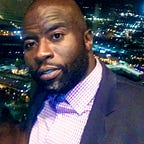“Separate approaches for seeking Black reparations don’t have to further divide us”
“To be black and conscious in America is to be in a constant state of rage.”-James Baldwin
Growing up between Middle America and Canada, as a first-generation Ghanaian, I could relate to James Baldwin quotes. But it was not until my teenage years that I came to understanding that I was viewed as too “American” to be “African” while being too “African” to be “American.”
During childhood, my internal compass was uncertain. My skin and other physical features told me I was the same as my peers. Yet, fighting my peers at a young age became my norm.
My Black-American stepmom affirmed my need for self-pride in my Ghanaian traditions while the only grandfather I physically known happened to be a Black man from Mississippi. Obydee McKnight immersed me in Southern Black American culture.
Enrolling in a historically Black university was my surefire way of finally finding my space in this dual world I had lived in for so long. Studying various great Black-American movements and the thought leaders of those eras as matriculated on the hallowed campus grounds of Hampton University immediately helped me define the connection to many of my African leaders. I embraced this new way of connective thinking as I went into my career field of multimedia, using my platform as an international bridge.
Ready to use my voice to amplify our stories here in the diaspora and on the continent, imagine my surprise when reality showed me how separate and tribal my people truly are both at home and abroad.
Even in 2020, Marcus Garvey has been said to still be one of the most influential historical public figures ever. Garvey is credited as the leader of the “Pan African Movement,” although he was a Jamaican-born immigrant in America, Garvey’s organization in 1919 United Negro Improvement Association (UNIA) had 30 branches and over 2 million members worldwide. We can easily agree that this movement planted seeds of liberation for African Nations and the Civil Rights Movement leading to both the FBA and ADOS movement of today.
Yet, after all these many accomplishments, as his descendants, we still find ourselves with moral internal compasses calibrated with uncertainty; the presences of Foundational Black American (FBA) and/or American Descendant of Slavery (ADOS) reveal new forms, and branches of tribalism within our communities.
So, when I see the concepts of Foundational Black Americans and ADOS emerging as popular among African Americans, I cannot help but lament that they are beautiful, inspiring conceptual movements that enroll us in the demanding of capital assets for years of generational oppression; however, they both have evolved into degradations to the foundations on which they stand.
Foundational Black Americans, an ideology championed by film producer Tariq Nasheed, asserts that “a Foundational Black American is any person classified as Black, who can trace their bloodline lineage back to the American system of slavery. To be designated as an FBA, at least one parent must come from a non-immigrant background in The United States of America.”
Nasheed believes that it is imperative that FBAs take up the mantle and seek out reparations for their own, much in the way that African groups across the diaspora have done in their respective countries and regions. He feels that, for far too long, American-born descendants of the American slave trade have indiscriminately fought for the rights and reparations of all African people without adequately seeking out resources for themselves.
Simultaneously, Yvette Carnell and Antonio Moore, the founder of the hashtag #ADOS (African Descendants of Slavery), have made reparations for the system of slavery in the United States a key tenet of their platform.
According to its website ados101.com, the ideology “sets out to shift the dialogue around the identity of what it is to be African American in an effort to move the discussion from melanin, and properly center the discussion around lineage.”
Even though history has proven it is, was, and still a global effort of Black people to journey ourselves in the emancipation of us all.
And, while I do strongly believe in reparations for all descendants of the enslaved Africans in the United States of America — we must be clear in messaging that Black Africans, Black Latinos, Black Caribbeans, Black South Americans (henceforth and so on) is not the enemy of Black America. We all possess the same goal: LIBERATION!
It is as if we are all in the same arena watching the same game — however, where you are seated determines your point of view and experience.
In recognizing my dual life as a first generation African in America, I have learned to move to different sections of the arena to gain understanding from other spectators with whom we share our Black experiences, in America and internationally.
Thus, always seeking to use my voice as a connector and not as a divider and pulling for a collective solution, not pushing separatism through glorifying that your pain hurts more than mine and that of our ancestors.
